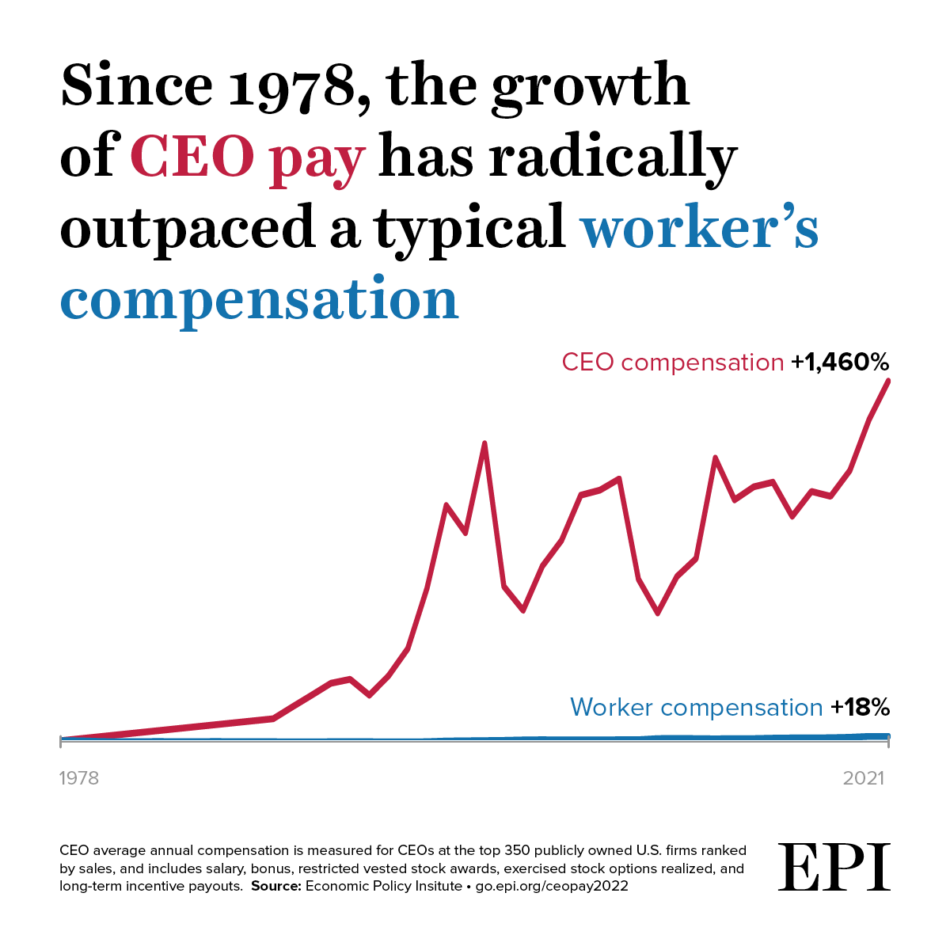- cross-posted to:
- [email protected]
514
- cross-posted to:
- [email protected]
CEO pay has skyrocketed 1,460% since 1978: CEOs were paid 399 times as much as a typical worker in 2021
www.epi.orgWhat this report finds: Corporate boards running America’s largest public firms are giving top executives outsize compensation packages that have grown much faster than the stock market and the pay of typical workers, college graduates, and even the top 0.1%. In 2021, we project that a CEO at one of the top 350 firms in the U.S. was paid $27.8 million on average (using a “realized” measure of CEO pay that counts stock awards when vested and stock options when cashed in). This 11.1% increase from 2020 occurred because of rapid growth in vested stock awards. Using a different “granted” measure of CEO pay (which counts the value of stock awards and options when granted rather than realized), average top CEO compensation was $15.6 million in 2021, up 9.4% since 2020. In 2021, the ratio of CEO-to-typical-worker compensation was 399-to-1 under the realized measure of CEO pay; that is up from 366-to-1 in 2020 and a big increase from 20-to-1 in 1965 and 59-to-1 in 1989. CEOs are even making a lot more than other very high earners (wage earners in the top 0.1%)—almost seven times as much. From 1978 to 2021, CEO pay based on realized compensation grew by 1,460%, far outstripping S&P stock market growth (1,063%) and top 0.1% earnings growth (which was 85% between 1978 and 2021, according to the latest data available). In contrast, compensation of the typical worker grew by just 18.1% from 1978 to 2021.
Why it matters: Exorbitant CEO pay is a major contributor to rising inequality that we could restrain without doing any damage to the wider economy. CEOs are getting ever-higher pay over time because of their power to set pay and because so much of their pay (more than 80%) is stock-related. They are not getting higher pay because they are becoming more productive or are more skilled than other workers. This escalation of CEO compensation and of executive compensation more generally has fueled the growth of top 1% and top 0.1% incomes, leaving fewer of the gains of economic growth for ordinary workers and widening the gap between very high earners and the bottom 90%. The economy would suffer no harm if CEOs were paid less (or were taxed more).
How we can solve the problem: We need to enact policy solutions that would both reduce incentives for CEOs to extract economic concessions and limit their ability to do so. Such policies could include reinstating higher marginal income tax rates at the very top; setting corporate tax rates higher for firms that have higher ratios of CEO-to-worker compensation; using antitrust enforcement and regulation to restrain the excessive market power of firms—and by extension of CEOs; and allowing greater use of “say on pay,” which allows a firm’s shareholders to vote on top executives’ compensation.
“average top CEO compensation was $15.6 million in 2021, up 9.8% since 2020. In 2021, the ratio of CEO-to-typical-worker compensation was 399-to-1 under the realized measure of CEO pay; that is up from 366-to-1 in 2020 and a big increase from 20-to-1 in 1965 and 59-to-1 in 1989”



I think it’s not so much that people can’t look up the roles, but that most people grinding away in a wage-slave role don’t have context for what is actually done at the higher level. They are too insulated from the day to day of those roles which make it easier to write them off wholesale as useless. That being said, CEO compensation across the board is not in line with any actual productivity or effectiveness metrics, let’s be real, and certainly should not be anywhere near as high in comparison to the average employee. But that’s a separate and more nuanced conversation that can’t be solved with a simple “fire all CEOs hurdur” comments that you’ll see online.
I’m all for CEO pay caps, as the CEO market is totally fucked
CEOs often do real work for a company, people who sit on a board don’t. Board directors are often on the boards of several companies, because being on one board alone is not nearly hard enough to qualify being a job in and of itself.
These people rake in money as if each of those board seats were a super job, effectively equivalent to hundreds or thousands of workers, while it requiring no where near the level of effort or expertise that an actual job requires.
Capitalism isn’t meritocratic like pro-capitalists love to believe. Capitalism is a system designed for and by the owner class to protect said property owning class.
If you want a meritocracy, you want a market socialist system. It’ll still have some problems capitalism has by the nature of markets (externalized costs aren’t accounted for by markets), but it’s at least a proper meritocracy when renting humans is illegal like buying them already is.